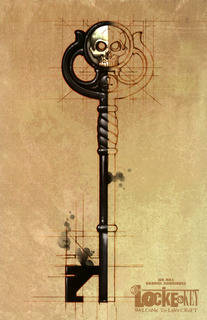written by Joe Hill
art by Gabriel Rodriguez
What subtlety Locke & Key lacks in title and town name—Lovecraft, from whom its mythological underpinnings and horror tone draw inspiration—it makes up for in excellent storytelling. Relocated to a family mansion in Massachusetts named Keyhouse, a house as mysterious as it is unlikely, after a deadly home invasion by a vulnerable and unstable teen, the remainder of the Locke family soon find themselves again in danger from a strange creature living on the grounds. As an opening chapter, Welcome to Lovecraft lays the foundations for a number of promising narrative possibilities: the plethora of house keys, each presumably with its own door and magical power; the identity of the strange and seductive "echo" in the wellhouse; and the histories of the Locke family, particularly that of dead patriarch Rendell who seems once as a teen to have discovered many of the keys' secrets, and of Keyhouse itself.
Much like his father's, horror novelist and fellow Maine native Stephen King, Hill's New England is a moody, gothic landscape, which like Keyhouse itself is layered with half-forgotten histories of its residents and constructed to preserve their mysteries. It's an aesthetic which Hill employs very knowingly and not entirely without humor, as when Tyler quips to his uncle Duncan upon their arrival in Massachusetts, "Was it weird to grow up in a house with a name?" In this way, Hill invests his setting with a mystique independent of his other characters, with a personality all its own. Perhaps most puzzling, given the apparent dangers lurking in Keyhouse's forgotten places, is Rendell Locke's conviction that his family would be safest there and his faith in the house's own inherent intuition, as Tyler recalls in a flashback at the funeral.
 The Keys:
The Keys:Ghost Key, when used with the Ghost Door, temporarily kills its user, who with his body being dead may wander then as a ghost within the grounds of Keyhouse, being flashed instantly to people, places, or objects he thinks about or to people who are thinking about him.
Anywhere Key transforms any door with a keyhole into any other door its user can clearly visualize. Its use is not limited to Keyhouse.
Gender Key, when used with its corresponding door, transfigures its user into the opposite gender.
Collects Locke & Key: Welcome to Lovecraft #1-6
ISBN: 978-1600201370

No comments:
Post a Comment